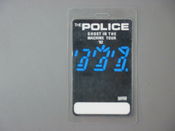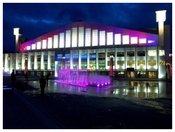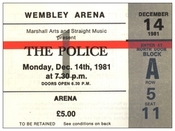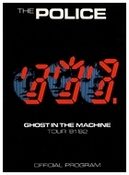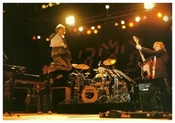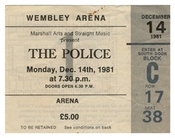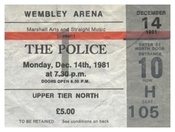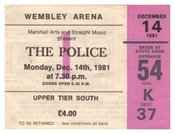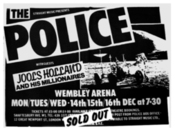
The Police at Wembley Arena...
The principal surprise on Monday, at the first night of the Police's British tour, was the appearance , at last, of the film which they devised to accompany 'Invisible Sun', their ballad about Northern Ireland. A collage of Ulster street scenes incorporating urchins, graffiti, Saracens and soldiers, it was recently banned from Top of the Pops and was used at Wembley as a massive back-projection, effectively echoing the song's downbeat sentiment.
Unsuitable for family viewing? A brave attempt to do for the Irish situation what rock music did for Vietnam, by drawing it into peak-time entertainment? Or just another bunch of pop stars getting too big for their sneakers? To be it seemed good-hearted and utterly uncontentious.
In more general terms, the concert was a fine exposition of the group's limited but pleasing resources. They began in fifth gear, with 'Message in a Bottle', and 'Every Little Thing', switched to overdrive with 'Spirits in the Material World' and stayed at that pace for the remainder of a set lasting just over an hour. This comparative brevity was well judged: the addition of a three-man horn section and the continuing expansion of the range of their guitarist, Andy Summers, lends them more depth than before, but the very specific nature of their approach, and a consequent lack of real variation, would have made a longer stretch wearing.
The horns, a trumpeter and two saxophonists imported from the funk of factories of New Jersey, were felt rather than heard, generally employed to thicken the textures beneath Summers's spreading chords. They did, however, also add chewed-down riffs to a driving version of 'When the World is Running Down', artfully echoing that sublime line about ''James Brown on the TAMI show'', and a short, elegant flugelhorn solo added welcome colour to 'Spirits in the Material World'.
Sting, the group's singer, was in excellent form, his voice clear and powerful, his presence thoroughly engaging as he led the massive crowd through an ecstatic singalong in 'Roxanne'. There is, too, now enough available material to allow him to edit the passages of scat singing and dub improvisation down to a level of infrequency which makes them all the more effective.
(c) The Times by Richard Williams
Still the kings...
Big Sting is watching you. Glowering out of glossy pages, philosophising in Sunday papers and talking about baby care and the intimate details of his sex life.
1981 has been the year when he and the Police became household words, when mothers and daughters both fantasised about the peroxide hunk of beefcake. So what more statements could the band possibly make? What could they do to make this show anything else than an obligation? A cosy way to round off the year and go into tax exile.
A hell of a lot, I assure you. After a year of massive exposure, I was expecting the rot to set in, for contempt and complacency to read across the face of the Police. What with the ticket rip off stories about the shows, the omens didn't bode well - but on their opening night at Wembley the Police provided a feast of entertainment and the capacity crowd (The first real sell out I've seen here for a long time) carved it up.
Never a sterile replay of old hits, the Police had a three piece rhythm section all the way from New Jersey, and the songs took on a fresh set of values and immediacy. Steve and Carol from Surbiton gibbered excitedly at one another as the lights went down and the lads jogged across the stage, all bright smiles and tanned bodies like a collective Cliff Richard. Sting swayed on the upright bass for 'Message In A Bottle' setting a pace that very nearly ran away with him. All in all a pretty mind boggling start though, and they settled down for an understated yet passionate version of 'Every Little Thing She Does Is Magic'.
And then followed 'Spirits In The Material World' full of enigmatic vocals and a languid brass outro before the pitch shifted to the cudgelling near-salsa version of 'The Bed's Too Big Without You'.
'Demolition Man' was really Summer's possession with a freshly dreamed-up solo and they followed it with 'One World Is Enough For All Of Us'' as vital as the album version. Brilliant timing meant that 'Invisible Sun' was next, with the controversial banned video do a big screen at the back.
Far from being a political statement on who's right or who's wrong, the footage seems to be in sympathy with the tragedy of the situation, particularly as the shots are in grainy cold black and white. What a braggart of a drummer Stewart Copeland was, never overloud but full of verve and subtlety.
'Roxanne' turned the lights on again, Sting full of pride and passion mounted atop a particularly ball grabbing rhythm section. ''What shall we play next?'' asked Sting, like a little kid and all the girls in the audience swooned. Yes, yes, yes, obviously it was 'Don't Stand So Close To Me', the most dramatic song that night and 'Walking On The Moon' a classic of basic Police material.
Thousands bellowed themselves hoarse for this homecoming, but there will be those hacks who will continue to unfairly criticise the Police. People who won't admit in their hearts that they must have just a little bit of ability and emotion. Some critics will hound the Police like a pack of wolves, white expounding a world of bleak Pop Aural dirges, Blue Ronde, the Slits and Rip Rig And Panic. God save us all.
All I know is, I had a bloody good time at this concert. Good luck to the Police, monster egos and all.
And let's not forget Jools Holland, the man who had the daunting task of opening the show. Perpetually optimistic, Holland fought for attention and got it through a selection of swing and blues that grows on me the more I hear it. All this boy really needs for the big time is that elusive hit single...
(c) Record Mirror by Robin Smith
The principal surprise on Monday, at the first night of the Police's British tour, was the appearance , at last, of the film which they devised to accompany 'Invisible Sun', their ballad about Northern Ireland. A collage of Ulster street scenes incorporating urchins, graffiti, Saracens and soldiers, it was recently banned from Top of the Pops and was used at Wembley as a massive back-projection, effectively echoing the song's downbeat sentiment.
Unsuitable for family viewing? A brave attempt to do for the Irish situation what rock music did for Vietnam, by drawing it into peak-time entertainment? Or just another bunch of pop stars getting too big for their sneakers? To be it seemed good-hearted and utterly uncontentious.
In more general terms, the concert was a fine exposition of the group's limited but pleasing resources. They began in fifth gear, with 'Message in a Bottle', and 'Every Little Thing', switched to overdrive with 'Spirits in the Material World' and stayed at that pace for the remainder of a set lasting just over an hour. This comparative brevity was well judged: the addition of a three-man horn section and the continuing expansion of the range of their guitarist, Andy Summers, lends them more depth than before, but the very specific nature of their approach, and a consequent lack of real variation, would have made a longer stretch wearing.
The horns, a trumpeter and two saxophonists imported from the funk of factories of New Jersey, were felt rather than heard, generally employed to thicken the textures beneath Summers's spreading chords. They did, however, also add chewed-down riffs to a driving version of 'When the World is Running Down', artfully echoing that sublime line about ''James Brown on the TAMI show'', and a short, elegant flugelhorn solo added welcome colour to 'Spirits in the Material World'.
Sting, the group's singer, was in excellent form, his voice clear and powerful, his presence thoroughly engaging as he led the massive crowd through an ecstatic singalong in 'Roxanne'. There is, too, now enough available material to allow him to edit the passages of scat singing and dub improvisation down to a level of infrequency which makes them all the more effective.
(c) The Times by Richard Williams
Still the kings...
Big Sting is watching you. Glowering out of glossy pages, philosophising in Sunday papers and talking about baby care and the intimate details of his sex life.
1981 has been the year when he and the Police became household words, when mothers and daughters both fantasised about the peroxide hunk of beefcake. So what more statements could the band possibly make? What could they do to make this show anything else than an obligation? A cosy way to round off the year and go into tax exile.
A hell of a lot, I assure you. After a year of massive exposure, I was expecting the rot to set in, for contempt and complacency to read across the face of the Police. What with the ticket rip off stories about the shows, the omens didn't bode well - but on their opening night at Wembley the Police provided a feast of entertainment and the capacity crowd (The first real sell out I've seen here for a long time) carved it up.
Never a sterile replay of old hits, the Police had a three piece rhythm section all the way from New Jersey, and the songs took on a fresh set of values and immediacy. Steve and Carol from Surbiton gibbered excitedly at one another as the lights went down and the lads jogged across the stage, all bright smiles and tanned bodies like a collective Cliff Richard. Sting swayed on the upright bass for 'Message In A Bottle' setting a pace that very nearly ran away with him. All in all a pretty mind boggling start though, and they settled down for an understated yet passionate version of 'Every Little Thing She Does Is Magic'.
And then followed 'Spirits In The Material World' full of enigmatic vocals and a languid brass outro before the pitch shifted to the cudgelling near-salsa version of 'The Bed's Too Big Without You'.
'Demolition Man' was really Summer's possession with a freshly dreamed-up solo and they followed it with 'One World Is Enough For All Of Us'' as vital as the album version. Brilliant timing meant that 'Invisible Sun' was next, with the controversial banned video do a big screen at the back.
Far from being a political statement on who's right or who's wrong, the footage seems to be in sympathy with the tragedy of the situation, particularly as the shots are in grainy cold black and white. What a braggart of a drummer Stewart Copeland was, never overloud but full of verve and subtlety.
'Roxanne' turned the lights on again, Sting full of pride and passion mounted atop a particularly ball grabbing rhythm section. ''What shall we play next?'' asked Sting, like a little kid and all the girls in the audience swooned. Yes, yes, yes, obviously it was 'Don't Stand So Close To Me', the most dramatic song that night and 'Walking On The Moon' a classic of basic Police material.
Thousands bellowed themselves hoarse for this homecoming, but there will be those hacks who will continue to unfairly criticise the Police. People who won't admit in their hearts that they must have just a little bit of ability and emotion. Some critics will hound the Police like a pack of wolves, white expounding a world of bleak Pop Aural dirges, Blue Ronde, the Slits and Rip Rig And Panic. God save us all.
All I know is, I had a bloody good time at this concert. Good luck to the Police, monster egos and all.
And let's not forget Jools Holland, the man who had the daunting task of opening the show. Perpetually optimistic, Holland fought for attention and got it through a selection of swing and blues that grows on me the more I hear it. All this boy really needs for the big time is that elusive hit single...
(c) Record Mirror by Robin Smith

